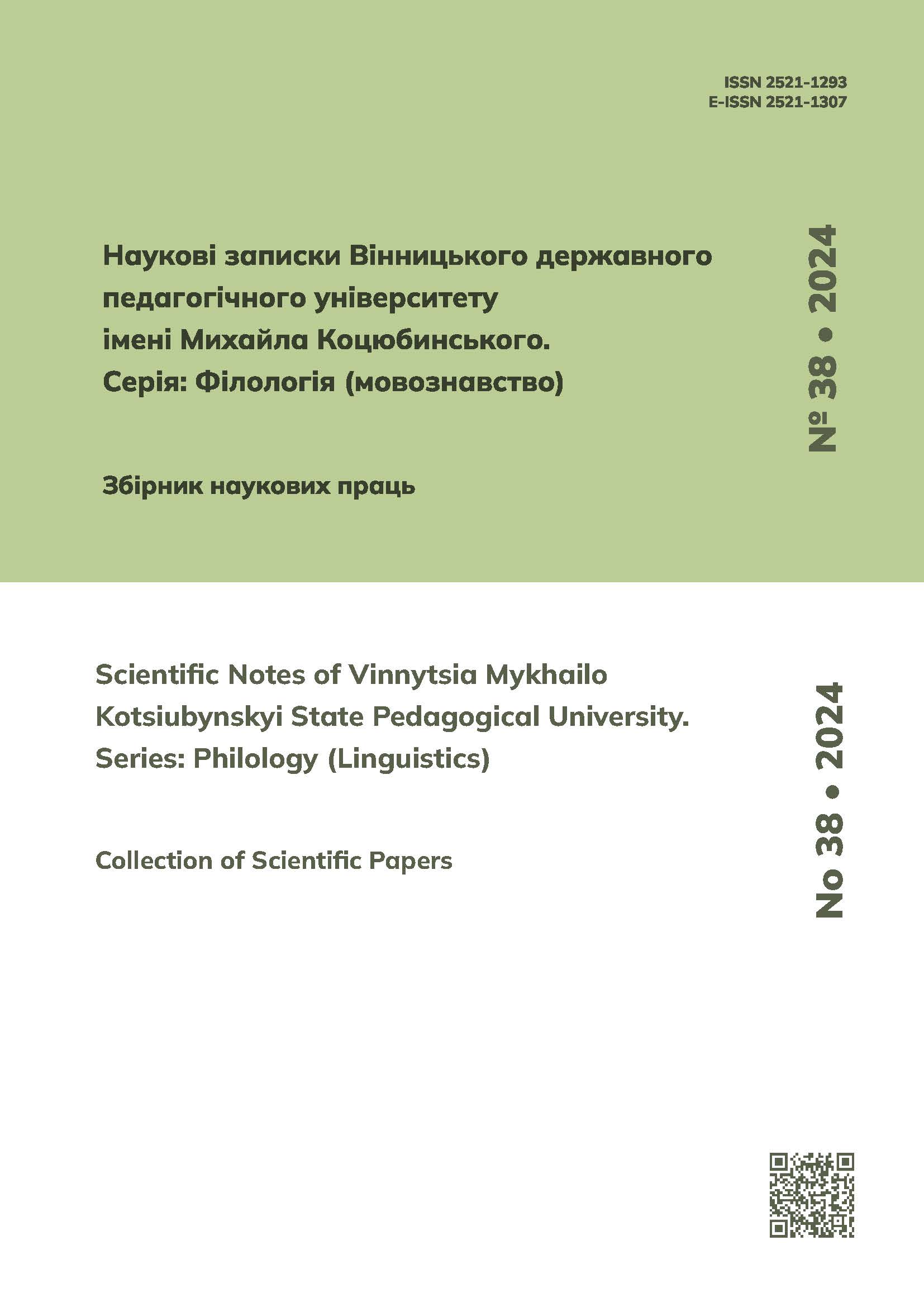Linguistic strategies in media discourse: analysis and interpretation
https://doi.org/10.31652/2521-1307-2024-38-08Published 2024-08-14
Keywords
- language strategies, media discourse, British English, analysis, interpretation, content analysis, discourse analysis, psycholinguistic analysis
Copyright (c) 2024 Tetiana Tsepkalo

This work is licensed under a Creative Commons Attribution 4.0 International License.
How to Cite
Abstract
The article analyses linguistic strategies in media discourse, focusing on the British national variant of the English language. Media plays a crucial role in shaping public opinion and influencing societal perceptions. Understanding the linguistic strategies employed in media discourse is essential for deciphering how narratives are constructed and how information is manipulated to impact audiences.
The primary purpose of this study is to identify and analyse the linguistic strategies used in British media to influence their audience. The objectives include a content analysis of media texts, identifying key linguistic strategies and techniques, revealing the impact of these strategies on the audience, and providing practical recommendations for studying media texts. Methods. This research employs content analysis, discourse analysis, and psycholinguistic analysis. Content analysis involves categorising different media texts (news articles, features, interviews) and examining their content. Discourse analysis focuses on the structure and content of the texts to identify how narratives are constructed and which linguistic techniques are used to influence the audience. Psycholinguistic analysis examines the psychological impact of these linguistic strategies on the audience's perception of information. Results. The analysis reveals significant differences in linguistic strategies across various media sources, including newspapers, television, and online media. Key linguistic strategies include metaphors, epithets, rhetorical questions, and irony. These strategies are crucial in shaping narratives and influencing public perception. Additionally, the frequency and intensity of these strategies vary depending on the target audience and the specific goals of the media outlet. For instance, newspapers may employ more sophisticated and subtle language techniques, while online media often use more direct and engaging language to capture immediate attention. The study also highlights the dynamic nature of linguistic strategies, adapting to the evolving media landscape and audience preferences. Originality. This study provides a comprehensive analysis of linguistic strategies in British media, highlighting the specific techniques used to influence audiences. The originality lies in the detailed examination of different media formats and combining content analysis, discourse analysis, and psycholinguistic analysis to provide a holistic understanding of media influence. Conclusion. The study concludes that linguistic strategies are vital in media discourse, significantly impacting audience perception and shaping public opinion. The findings underscore the importance of critical analysis of media texts and provide valuable insights for media analysts, journalists, and linguists. Further research is recommended to explore the evolving nature of linguistic strategies in digital media and their implications for public discourse.
Downloads
References
- Кулик, В. (2010). Дискурс українських медій: ідентичності, ідеології, владні стосунки : монографія. Київ: Критика, 656 с.
- Кушніров, М. (2021). Лінгвальні засоби спотворення інформації в англомовному медійному дискурсі: методика виявлення. Вчені записки Таврійського національного університету імені В. І. Вернадського. Серія : Філологія. Журналістика, Т. 32(71), № 4 (1), С. 168-172. https://doi.org/10.32838/2710-4656/2021.4-1/29 DOI: https://doi.org/10.32838/2710-4656/2021.4-1/29
- Руденко, Н. (2022). Сугестія як засіб формування громадської думки в сучасних англомовних інтернет-виданнях: інформаційно-комунікаційні стратегії та способи їх реалізації : дис… доктора філософії в галузі журналістики: 061 Журналістика. Суми, 235 с.
- Сіваєва, О. (2024). Вербалізація HEALTH в англомовному медійному дискурсивному просторі: дис… доктора філософії : 035 Філологія. Київ, 302 с.
- Шкворченко, Н. (2024). Просодичні характеристики токсичності в англомовному медійному дискурсі. Вчені записки Таврійського національного університету імені В. І. Вернадського. Серія : Філологія. Журналістика, № 35(74). С. 152-156. https://doi.org/10.32782/2710-4656/2024.2.1/28 DOI: https://doi.org/10.32782/2710-4656/2024.2.1/28
- Шумарова, Н., Мариненко, І. & Михайленко, В. (2022). Алгоритм аналізу логіко-лінгвальної співвіднесеності компонентів «Заголовок–Лід» (на матеріалі інформаційних текстів про Covid-19). Актуальні проблеми медіапростору: матеріали IV Всеукраїнської науково-практичної конференції (Київ, 14 квітня 2022 р.) Київ: Навчально-науковий інститут журналістики, С. 13-22.
- AP (2024) – Associated Press. Astronauts in Boeing capsule arrive at space station. BBC News. June 6. https://www.bbc.com/news/articles/c8vvrrv1mg1o
- Greve, J. (2024). Trump’s lead over Biden narrows after conviction, analysis shows. The Guardian, June 7. https://www.theguardian.com/us-news/article/2024/jun/07/trump-biden-election-standing-after-conviction
- Harris, K. (2024). The love language test. BuzzFeed, February 12. https://www.buzzfeed.com/macedog14/love-language-quiz
- Hudspeth, C. (2024). 62 examples of the Mandela effect that'll make you question everything. BuzzFeed, May 25. https://www.buzzfeed.com/christopherhudspeth/mandela-effect-examples
- Stopera, M. (2024). People are sharing examples of «boomer humor» they find painfully cringe or surprisingly funny. BuzzFeed, May 25. https://www.buzzfeed.com/mjs538/people-are-sharing-examples-of-boomer-humor
- Thorpe, T. & Orobitg-Baena, C. (2024). Rishi Sunak D-Day row: ‘How could anyone vote Tory after this?’ The Telegraph, June 7. https://www.telegraph.co.uk/politics/2024/06/07/rishi-sunak-dday-row-how-could-anyone-vote-tory
- Torres, M. (2024). People are sharing what it's like to job-hunt over 50 – and it's harrowing. HuffPost, May 6. https://www.huffpost.com/entry/job-hunting-over-50_l_66269df8e4b04378c08b05b8





